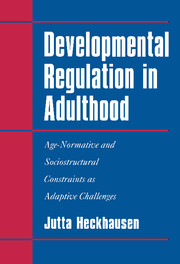 Developmental Regulation in Adulthood
Developmental Regulation in Adulthood Published online by Cambridge University Press: 05 September 2009
This final chapter will briefly review the conclusions that can be drawn from the theory and empirical research presented in the previous chapters. Because of the nature of this research program, the theory is much larger in scope than the empirical studies reported. Therefore, the tasks and questions set for empirical research, which follow from the lifespan theory of control and its model of developmental regulation, are extensive. Some selected prospects for future research in each of the areas covered will be developed in the following section. Because of the wide scope of phenomena involved in developmental regulation across the life course, the discussion of research prospects needs to be selective and focused on areas of particular intellectual promise.
The great variability and relative dearth of biologically based determination in human behavior pose two basic challenges to human behavioral regulation: the management of selectivity and failure compensation (J. Heckhausen & Schulz 1995). The individual needs to choose certain action goals out of many alternatives and then focus the investment of resources for primary control on the goal selected. Moreover, the individual has to compensate for the frustration and threat to self-esteem that may result from regular failure experiences. In the context of ontogenetic change across the life course, both selectivity and failure compensation become even more pressing and more essential.
To save this book to your Kindle, first ensure no-reply@cambridge.org is added to your Approved Personal Document E-mail List under your Personal Document Settings on the Manage Your Content and Devices page of your Amazon account. Then enter the ‘name’ part of your Kindle email address below. Find out more about saving to your Kindle.
Note you can select to save to either the @free.kindle.com or @kindle.com variations. ‘@free.kindle.com’ emails are free but can only be saved to your device when it is connected to wi-fi. ‘@kindle.com’ emails can be delivered even when you are not connected to wi-fi, but note that service fees apply.
Find out more about the Kindle Personal Document Service.
To save content items to your account, please confirm that you agree to abide by our usage policies. If this is the first time you use this feature, you will be asked to authorise Cambridge Core to connect with your account. Find out more about saving content to Dropbox.
To save content items to your account, please confirm that you agree to abide by our usage policies. If this is the first time you use this feature, you will be asked to authorise Cambridge Core to connect with your account. Find out more about saving content to Google Drive.